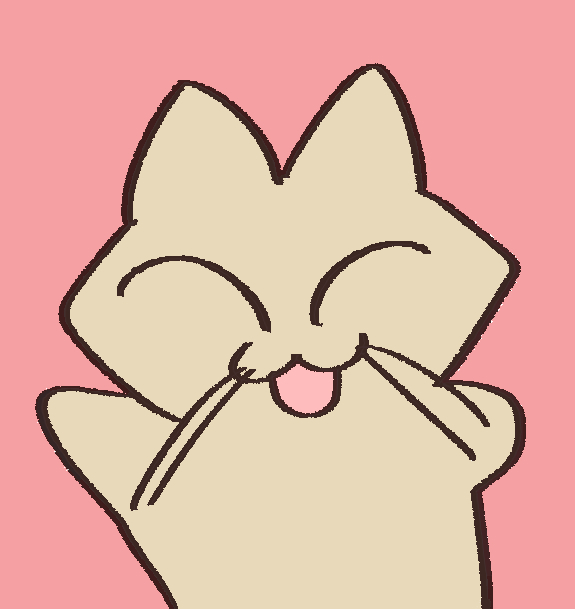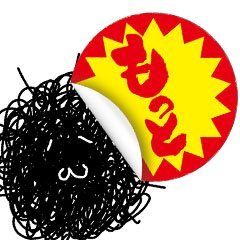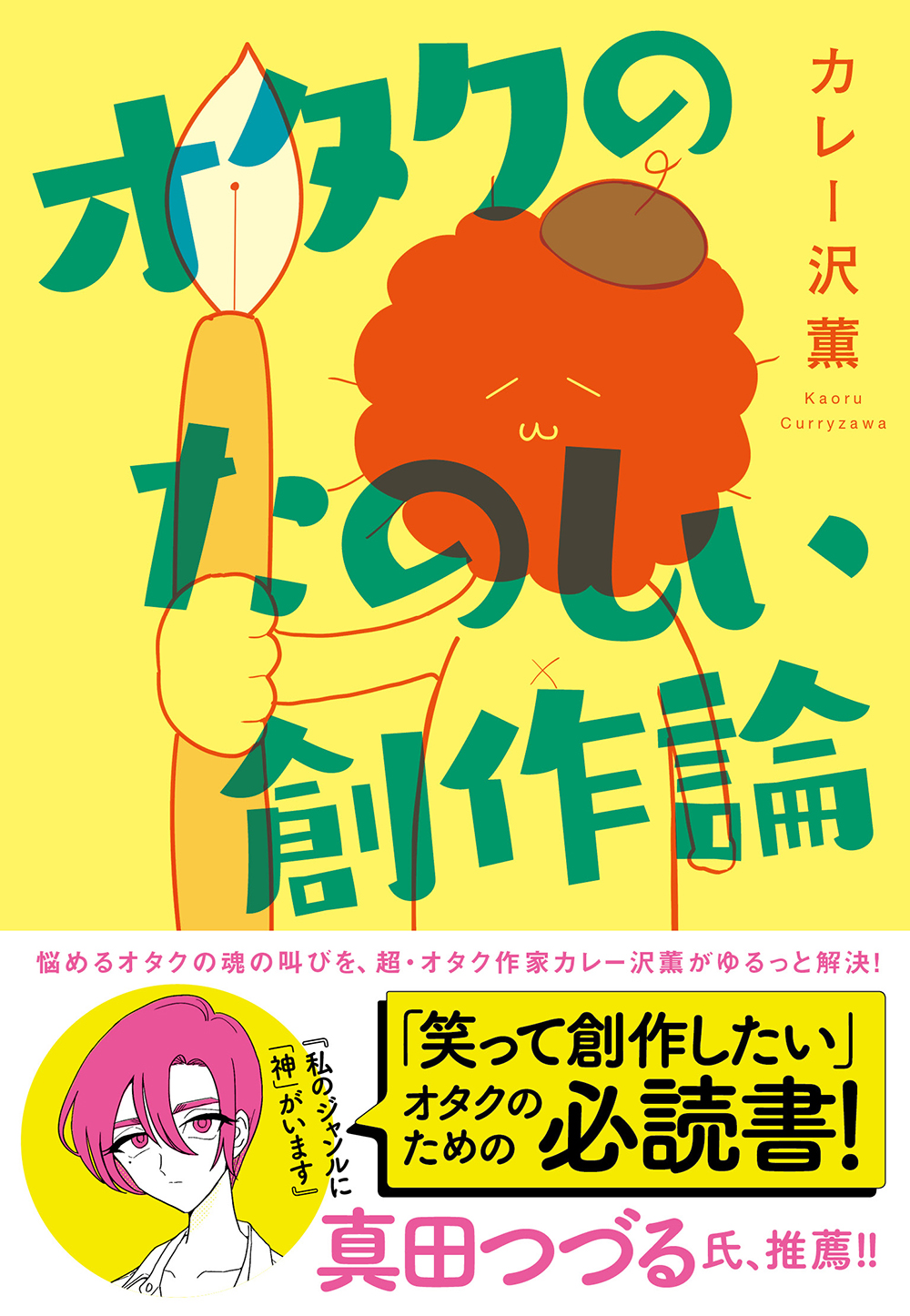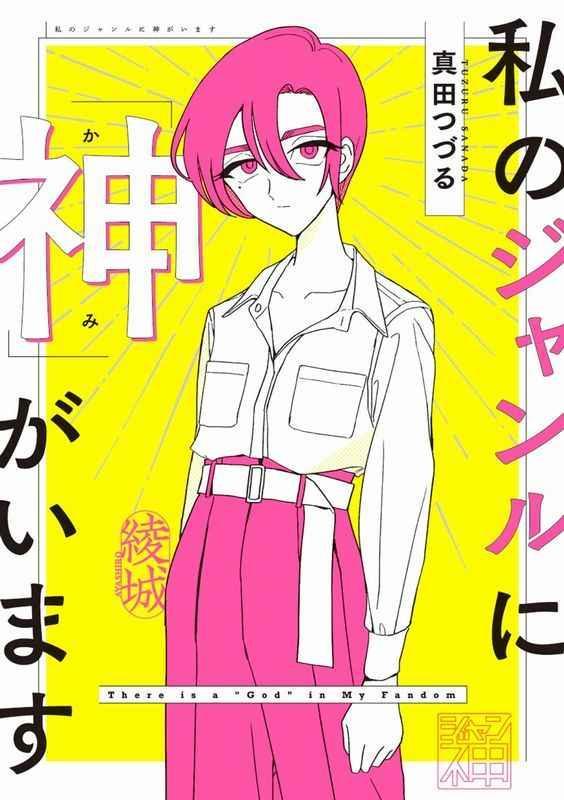Does jealousy grow stronger if you're ignorant of how hard the other person worked? Curry Zawa Kaoru and Tsuzuru Sanada discuss the challenges surrounding creativity
Interview by Ichibo Harada@HEW
Tsuzuru Sanada, known for works such as Doujin Onna no Kanjo (The Emotions of Doujin Women) and Watashi no Genre ni Kami ga Imasu (There's a God in my Niche), wrote the blurb for the book's wraparound band.
Today, we spoke with these two authors, both of whom have a deep understanding of the joys and sorrows that surround creative activities, and who talked candidly about the "struggles of creation" that each of them faces.
Never invalidate how people feel
── Sanada, I hear you're a long-time fan of Curry Zawa Kaoru's Creative Counseling.

As a mangaka who draws women active in the doujin world, I feel a thematic connection. Every consultation feels familiar to me, and I can relate to all of them.
The first installment of Doujin Onna no Kanjo depicts the joys and sorrows of doujinshi creators.
── Curry Zawa, you have also read Doujin Onna no Kanjo. What did you think of it?

Many readers were able to express themselves through their comments on this manga. Every episode has a hopeful ending that makes you feel like, even if you're unable to solve a certain problem, you can find a way to come to terms with it.
── Sanada, did you conduct any interviews or research for your manga?

I did this survey once where I asked people about the emotions they feel when creating. Surprisingly, I got about 500 replies, including lengthy ones of 2,000 to 3,000 characters.
── Although Curry Zawa's counseling requests are supposed to be within 400 characters, some of them are much longer than that. These people must be experiencing some intense emotions...! Is there anything you keep in mind when responding to such consultations, Curry Zawa?

The important thing is not to invalidate the emotions of the person seeking advice. Some consultations could be resolved with a simple remark like, "You're overthinking it," but people who contact me are genuinely upset, and I don't want to dismiss those heartfelt emotions. I make it a point to try and understand everyone's feelings.
── Sanada, what do you keep in mind when writing Watashi no Genre ni Kami ga Imasu?

I take great care not to make it a story about myself. By taking a step back, I hope to encourage readers to root for the characters.
Jealousy grows stronger when you're ignorant of the other person's efforts
── Sanada, do you find yourself comparing yourself to others, like the characters in your stories do?

── Did drawing Watashi no Genre ni Kami ga Imasu serve as therapy for you in some ways?

Yes, totally. Stories where hardworking characters find salvation also bring comfort to me personally. I've always felt that creation is a form of self-salvation, and I write stories with the hope that the characters will not end up broken, but will instead find their own happiness.
From the uplifting Doujin Ohimesama series.
── Sanada, how do you change your mindset when you're stuck in a rut of negative thinking?

── Do you ever compare yourself to others, Curry Zawa? How do you handle negative emotions?

I tend to be very jealous and despise it when others succeed. Even if it's a work I'm unfamiliar with, hearing that it's getting an anime adaptation or getting reprinted irritates me. But I also know that this jealousy is fleeting, so even though I'm angry, I can take comfort in knowing that this too shall pass. After sulking for a bit, I get tired and eventually start thinking that I'm not doing so badly myself. I also don't hide my jealousy and openly express it on social media. Actually, I was considering declining today's interview.
── Really?


Doujin Onna no Kanjo happened to be a hit, but the truth is all of my serialized works have their shortcomings, and I feel like I'm still a beginner with a long way to go...! Nevertheless, even well-known authors who have had great success have had works that did not go well. It's perfectly normal. I have a tendency to believe that now that I've made my commercial debut, everything has to be a hit and every chapter has to be interesting... It can be excruciating.
── How do you handle hateful messages on Marshmallow (the anonymous Q&A service) and other negative feedback?

I don't have Marshmallow, so no one can say mean things to my face. But because I spend all day Googling my own name, I do find negative comments. Well, it's my own fault for going looking for them, so I just mute or hide them and forget about them. Even if there were valid points or critiques that I might agree with, I don't think it's worth listening to people who directly insult others.

When Doujin Onna no Kanjo went viral, I was just glad to get feedback from so many people. But eventually, I started to realize that if I was going to keep getting such a huge number of responses, I needed to separate myself from the work and take the comments in a way that was easier to handle.
I came to realize that some people out there are just discussing the work itself, which doesn't mean they have something against me as a person.
What does it mean to be bad at commercial work?
── If you have any creative concerns or worries that you're currently facing, please feel free to share. Since we're commemorating the publication of Curry Zawa Kaoru's Creative Counseling, it would be great if you could offer advice to each other as well!

I'll start. I've been working as an artist for many years, and I'm starting to lose the desire to draw. How can I rekindle that sensation?

I'm not sure if I'm the right person to advise you, but you could try looking back at your past works and reflecting on the challenges you faced at the time. When I come across something interesting in someone else's work, I make bullet-point notes. I also compile my favorite lines from my favorite works into a spreadsheet I named My Shining Stars...
── So you're the type who solves problems by writing them down.

Exactly. (laughs) It might be worth it to try to express your excitement through words.

Right, there must be times when you find something interesting or exciting, but then it ends and you forget about it. That's why it's important to write those moments down.
── How about you, Sanada?

I'm having a hard time mustering the courage to publish a new manga... I'm afraid that by releasing new material, it will become clear that the success of my first work was just a stroke of luck. I'm not just afraid of letting other people down, but also of letting myself down. I'm afraid that if that happens, I won't want to draw manga anymore...

Every time I put out a new manga, I still get nervous. But the outcome is rarely determined immediately after serialization. It takes time for something to become popular. Also, it's not true that your life is over if you fail. Even if something goes wrong, there will always be chances and offers. Through failure, you can learn more about your strengths and weaknesses. That's why I think it's important to keep drawing and showing people your work.

Thank you very much. I guess I lack the courage to confront my shortcomings because of my lack of experience.



Even though it's annoying to run into haters and critics, it can be comforting to think that you're getting these comments because you're a VIP.
Becoming gods through creation
── This is a bit of a basic question, but why do you both keep creating despite the challenges?

Creating something allows anyone to become a god of their own world and maybe even touch people's hearts with their work. That's pretty cool, right? Once you've created something and received feedback, it's hard to let go of the joy it brings. That's why new worries, like craving feedback, start to come up.
Even if the excitement of creating itself fades over time, the thrill of knowing your work has moved someone remains. Just a simple comment, like "Your work's so fun!" still gets me pumped.


I can totally relate to that. I find peace when I pour my sad or frustrating experiences into my work and someone appreciates or even finds them amusing.
── Finally, could you please share a message with those who are interested in creative activities but are hesitant to take the first step?

── Creative activities can be difficult at times, but there are also enjoyable moments in hell, right? Sanada, how about you?

Even completing a small piece of artwork provides a sense of accomplishment. It doesn't matter if it's a single-panel manga or a short story that fits in a single tweet. I'd like everyone to experience this one-of-a-kind joy that only those who have tried it can truly understand.
── Curry Zawa, Sanada, thank you very much!
"Otaku no Tanoshii Seisaku Ron" was released!
The popular column Curry Zawa Kaoru's Creative Counseling has been made into a book titled Otaku no Tanoshii Seisaku Ron (The Delightful Art of Otaku Creation, Bungeishunju).
In addition to fan-favorite episodes such as "Coping with fanwork taking a little too many liberties", "When you can't get feedback in an underdeveloped genre", "Is 40 too old for doujin events?" and "Understanding the troubles and contradictions of killing off your favorite characters", the book also includes brand new topics and advice!





